| Srl | Item |
| 1 |
ID:
177705
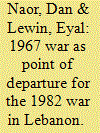

|
|
|
|
|
| Summary/Abstract |
Israel’s 1982 war in Lebanon is one of the most controversial events in its history. It is considered the war of Prime Minister Menachem Begin and his defense minister, Ariel Sharon, and hence a war of choice. One of the historical questions concerning that war revolves around its origins. The widespread assumption is that the roots can be found in 1981, the year in which Israel was on the verge of war with both Syria and the PLO. However, this article claims that the 1967 Six-Day War was the point of departure to the 1982 Lebanon War when the PLO settled in Lebanon. The issue of the origins of the 1982 war is not an exclusively historiographic matter. It has broader implications concerning the nature of the war. If the roots of the conflict can be found in 1967, then the war was a result of a prolonged process. Indeed, Israel started the war, but it was only after other options that it exercised had failed. Hence, it was not at all a war of choice.
|
|
|
|
|
|
|
|
|
|
|
|
|
|
|
|
| 2 |
ID:
185266
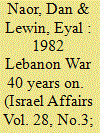

|
|
|
|
|
| Summary/Abstract |
Forty years after its occurrence, the 1982 Lebanon war remains academically understudied with the received wisdom about the conflict largely based on political and journalistic accounts. According to these accounts, the war was a political ploy by Defence Minister Ariel Sharon and Prime Minister Menachem Begin aimed at achieving far-reaching political goals rather than a defensive attempt to remove the terrorist threat to Israel’s northern areas. By placing the conflict within the context of Israeli history and the Arab-Israeli conflict, on the one hand, and the nature and characteristics of modern warfare, on the other, this article offers a more nuanced interpretation of the Lebanon War, showing that it was not fundamentally different from past military encounters.
|
|
|
|
|
|
|
|
|
|
|
|
|
|
|
|
| 3 |
ID:
128073
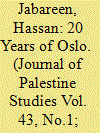

|
|
|
|
|
| Publication |
2014.
|
| Summary/Abstract |
The Oslo accords have been the subject of considerable debate ever since the
first agreement was signed in 1993. Most of the literature on the agreements
has dealt with their impact on the occupied territories (e.g. the growth of
settlements, the separation barrier, restrictions on movement), to the near
exclusion of the situation inside the Green Line. This essay, by contrast, focuses
on Oslo's consequences with regard to the status of the Palestinian citizens of
Israel, and the way that the conflict is conceptualized by Israeli Jewish society.
|
|
|
|
|
|
|
|
|
|
|
|
|
|
|
|
| 4 |
ID:
059205
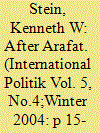

|
|
|
| 5 |
ID:
019751
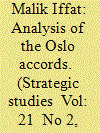

|
|
|
|
|
| Publication |
Summer 2001.
|
| Description |
134-145
|
|
|
|
|
|
|
|
|
|
|
|
|
|
|
|
| 6 |
ID:
011723


|
|
|
|
|
| Publication |
Autumn 1996.
|
| Description |
194-205
|
|
|
|
|
|
|
|
|
|
|
|
|
|
|
|
| 7 |
ID:
141349
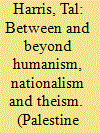

|
|
|
|
|
| Summary/Abstract |
The Jewish national movement convened under the Zionist Congress, and the Palestinian national movement did so under the umbrella of the Palestinian Liberation Organization (PLO). The two movements were largely secular and inspired by the national discourse that swept across Europe in the 19th century and into the Middle East following World War I. In their international advocacy, the leaderships of the two rival movements have consistently and repeatedly cited articles from international law, which recognizes the legitimacy of the right to self-determination of both peoples west of the Jordan (from the recommendations of the Peel Commission through United Nations General Assembly Resolution 181 to United Nations Security Council Resolution 242), often cherry-picking those articles that would support their unilateral actions. To mobilize their grassroots base, historical circumstances of persecution and plight were emphasized, and though they were objectively entirely different, they granted both movements a similar sense of urgency.
|
|
|
|
|
|
|
|
|
|
|
|
|
|
|
|
| 8 |
ID:
011739


|
|
|
|
|
| Publication |
Jan 1997.
|
| Description |
31-58
|
|
|
|
|
|
|
|
|
|
|
|
|
|
|
|
| 9 |
ID:
149821


|
|
|
|
|
| Summary/Abstract |
Insurgent movements have proliferated in ungoverned spaces in the Middle East and beyond. Jonathan Spyer examines the ways in which these groups tactics are changing to accommodate the semi-conventional role that they are increasingly playing.
|
|
|
|
|
|
|
|
|
|
|
|
|
|
|
|
| 10 |
ID:
138320
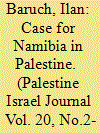

|
|
|
|
|
| Summary/Abstract |
In March 2006 I was received by President Hifikepunye Pohamba of Namibia, as the ambassador designate of Israel to that country, in his official residence in the capital city Windhoek. The tall and elegant man with a captivating beaming smile warmly received my letter of accreditation. According to protocol we sat for a short conversation. This was the opportunity for him to set the rules for our future relations.
|
|
|
|
|
|
|
|
|
|
|
|
|
|
|
|
| 11 |
ID:
062952


|
|
|
| 12 |
ID:
062985
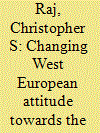

|
|
|
| 13 |
ID:
110845
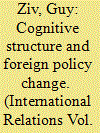

|
|
|
|
|
| Publication |
2011.
|
| Summary/Abstract |
Rationalist explanations of foreign policy change are underdetermined because they overlook the decision-makers themselves. Insight from cognitive psychology shows that individuals' cognitive structures provide a useful lens through which to understand why some people are more likely than others to change their core beliefs. Two related cognitive variables - cognitive openness and cognitive complexity - hold promise for enhancing extant explanations of foreign policy change. This article assesses the cognitive structure of the three leaders who dominated Israeli decision-making in the decade leading up to Israel's dramatic policy change vis-à-vis the PLO in 1993: Yitzhak Shamir, Yitzhak Rabin and Shimon Peres. The article demonstrates that Peres, who is found to be the most cognitively open and complex, was quicker to embrace a dialogue with the PLO than Rabin, while Shamir, who is found to hold the lowest levels of openness and complexity, rejected this move altogether. Peres, and to a lesser extent Rabin, proved to be more sensitive to international, regional and domestic changes than Shamir. This case illustrates that systemic-structural and domestic political factors are necessary, but insufficient, conditions for foreign policy change. The levels of decision-makers' cognitive openness and complexity are key to determining the likelihood that they will change their beliefs on a core policy issue that can, in turn, lead to foreign policy change. This article thus contributes to our understanding of both foreign policy change and the process leading up to the historic 1993 agreement between Israel and the PLO.
|
|
|
|
|
|
|
|
|
|
|
|
|
|
|
|
| 14 |
ID:
181223


|
|
|
|
|
| Summary/Abstract |
The architects of the Oslo process, at both the academic and intelligence levels, used the faulty ‘New Middle East’ paradigm to posit that the Palestinians were ripe for peacemaking. They ignored the considerable strength of the Islamists who, controlled by the Iranian regime, were deployed as peace spoilers. More than two decades after the collapse of the 2000 Camp David summit, the role of the Iranians has not been fully understood, leading most observers to assume that the Hamas and Palestinian Islamic Jihad are independent actors.
|
|
|
|
|
|
|
|
|
|
|
|
|
|
|
|
| 15 |
ID:
138328
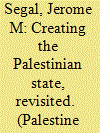

|
|
|
|
|
| Summary/Abstract |
In the spring of 1988 the first intifada was in its early months and had already achieved two big accomplishments: It had fully mobilized the Palestinian population in a way not seen in prior resistance to the occupation, and, it had won for the Palestinians worldwide attention and considerable sympathy for their plight. There was, however, a gaping hole: the absence of strategy. When you asked Palestinians in the Occupied Palestinian Territories (OPT) about how the intifada was to lead to the independent Palestinian state they said they were seeking, you got one of two answers: Either they said that the issue of grand strategy was up to the Palestinian Liberation Organization (PLO), or they invoked the idea of an international conference in which the Palestinians would be represented by the PLO and at which, somehow, the great powers — primarily the United States — would force upon Israel a Palestinian state and an end to the occupation.
|
|
|
|
|
|
|
|
|
|
|
|
|
|
|
|
| 16 |
ID:
063370
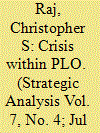

|
|
|
| 17 |
ID:
090121


|
|
|
|
|
| Publication |
2009.
|
| Summary/Abstract |
The PLO, the article attempts to prove, is dead, contributing to the withering of Palestinian diaspora political life. If true, the life and death of the PLO is rife with the paradox of substantiating the most basic of Zionist claims that reterritorialization and the withering of diaspora can only be perceived as a trade-off with a deterministic end in favour of political territoriality. Palestinians face the tragedy of being divided in the territory of contestation and are farther than ever from achieving statehood, while in the near abroad and beyond they are hardly in a position to form a trans-state community.
|
|
|
|
|
|
|
|
|
|
|
|
|
|
|
|
| 18 |
ID:
052739


|
|
|
| 19 |
ID:
063063
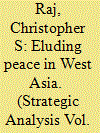

|
|
|
| 20 |
ID:
151813


|
|
|
|
|
| Summary/Abstract |
The ugly rhetoric that erupted between Israeli and American leaders in 2014 epitomized the rapid deterioration of the relations between the two leaderships, if not yet the two countries, since Barack Obama became the American president and Binyamin Netanyahu the Israeli prime minister in 2009. To be sure, there have been conflicts between Israeli and American leaders in the past, yet none of them reached the level of personal rancour seen in 2014 with Israeli Defence Minister Moshe Ya’alon disparaging Secretary of State John Kerry’s peace efforts as ‘obsessive and messianic’ and ‘senior administration officials’ deriding Netanyahu as a ‘chickenshit’ and a ‘coward’. Even the much vaunted security relationship between the two states began to suffer in 2014 as the US held up shipments of Hellfire missiles to Israel during its summer 2014 war against Hamas. While a renewal of the bilateral 10-year military aid agreement was signed in 2016, and the ascension of Donald Trump to the presidency may herald an improvement in bilateral relations, it remains to be seen if the damage to the US‒Israeli relationship done in the 2014–2015 period will be overcome.
|
|
|
|
|
|
|
|
|
|
|
|
|
|
|
|